Author Christopher L. Bennett’s next chapter in the ongoing Star Trek: Enterprise series is now available — Tower of Babel, the follow-up to 2013’s A Choice of Futures — and our Trek Literature master Dan Gunther talked with the writer this month about the next stop in the journey towards the United Federation of Planets.
Watch for our review of “Star Trek: Enterprise — Tower of Babel” coming soon!
![]()
TrekCore: How did you first get started as a Star Trek novelist?
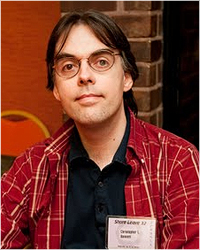
Christopher L. Bennett: Star Trek was my introduction to science fiction, space, and science. I first saw it when I was five years old, and it opened up a whole universe that my parents encouraged me to learn more about, beginning my lifelong interest in science and space.
Getting The Making of Star Trek at a school book sale in first grade also sparked my interest in the process of how stories are written and made. That probably had a lot to do with putting me on the path to becoming a writer.
I first came to the attention of Pocket Books’ Trek editors through the TrekBBS, whose Trek Literature forum the editors frequented at the time. Through my postings there, they became aware of me as a published author (just two novelettes in Analog Science Fiction and Fact at the time) who knew a lot about Trek, and eventually Keith R.A. DeCandido invited me to pitch to the Star Trek: S.C.E. eBook line he edited (later retitled Corps of Engineers).
He bought my proposal for Aftermath, which then led to Marco Palmieri inviting me to pitch for the Deep Space Nine: Prophecy and Change anthology, buying my proposal for “…Loved I Not Honor More” (which somehow ended up being my only published DS9 story to date—though technically, Department of Temporal Investigations counts as a DS9 spinoff). Once I had my foot in the door that way, I asked Marco if he’d be willing to look at a pitch for the novel I’d always wanted to write, and he said yes — that became Ex Machina, my first novel.
TrekCore: Your novels have a reputation for stitching together very disparate bits of Star Trek continuity. What is the greatest challenge you have faced when coming up with these ties? Is there a particular connection you’ve made that is your favorite?
Bennett: The greatest challenge would have to be what I attempted to do in Department of Temporal Investigations: Watching the Clock — taking all the disparate, often contradictory and fanciful assertions about time travel in the Trek franchise and wrangling them into some kind of a coherent framework that made relative sense from a physics standpoint. When I researched the existing theories of many-worlds quantum physics and the nature of time, I was surprised at how many things I thought were nonsense in Trek could actually be somewhat justified after all.
I don’t know if I can pick out a single favorite connection. I tend to think more about the big picture, the unifying theories that tie the whole thing together. I’m particularly proud of the galactic ecosystem of spacegoing lifeforms I devised for Titan: Orion’s Hounds and the ancient galactic prehistory in TNG’s The Buried Age.
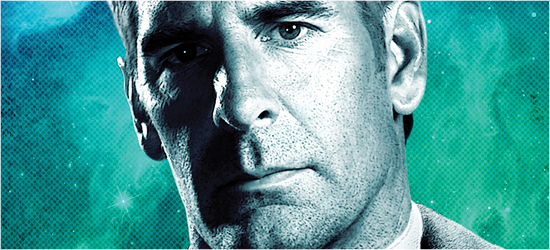
TrekCore: Rise of the Federation has been a surprise standout hit in the novel line. How did you approach telling this pivotal story? Was it your idea to chronicle the early days of the Federation, or was that an editorial choice?
Bennett: My initial suggestion was a series filling in the gap between the first Earth/Vulcan contact in 2063 and the beginning of Star Trek: Enterprise in 2151, exploring how humanity adjusted to contact with aliens, built their first colonies, and so on.
But my editor, Margaret Clark, recognized that there would be too few familiar characters in such a story, making it less marketable. She proposed that I instead tackle the period after the Romulan War and the founding of the Federation, which I soon realized was a great opportunity to fill in a virtually uncharted piece of Trek history.
TrekCore: The character work in Tower of Babel is outstanding. I especially enjoyed the characters of Valeria Williams and Samuel Kirk. Were there any particular inspirations for their characters?
Bennett: Thank you. The inspiration for Val and Sam is basically their descendant, James T. Kirk. Despite how he tends to be caricatured in popular perception, Kirk has always been a complex, multifaceted man, and my goal is to show where those facets come from. Val represents the aggressive side of Kirk, the lover and the fighter, the impulsive action hero.
Sam represents his more thoughtful side, the scholar and intellectual, the man of sensitivity and compassion. I made his female ancestor the tougher one because I like to subvert conventional gender roles. Strong, assertive women and sensitive, thoughtful men are recurring types in my work. Val has a fair amount in common with Emerald Blair, the heroine of my original novel Only Superhuman. But then, Emerald herself was influenced in part by Jim Kirk.
TrekCore: The political machinations in this novel seemed somewhat familiar, most notably in the election campaign on the Planetarist side. Did you have any modern-day influences on your depiction of the political struggle within the early Federation?
Bennett: Star Trek has always commented on current issues in an allegorical way, and that’s often an element in what I do. But I’m also a student of history, and I try to blend my present-day commentaries with historical analogies in order to illustrate the universal themes and patterns, to give a larger perspective and show that our problems and concerns today are generally nothing new or unique.
That ability to step back and look at our problems from the outside can hopefully give us more clarity and objectivity, and maybe help us look beyond the biases and preconceptions that can keep us from finding solutions.

So yes, the political dynamics in the early Federation are definitely a commentary on what’s going on in the United States and elsewhere in the world, with extremist or reactionary factions becoming more militant and attempting to undermine the process of cooperation and compromise that’s necessary for democracy to work. It’s good to have different parties representing different worldviews, so everyone will have a voice; but as the Vulcans say, the key is diversity in combination, not in relentless opposition.
The system works when people with different views are still willing to listen to each other and cooperate and compromise for the greater good. Extremists who want to tear down the system to score ideological points, and those who seek to lie and intentionally deceive the public to gain power, should be rejected and resisted.
TrekCore: The end of the novel sets up the next book in the series very nicely. Are there any tidbits you can give our readers about what we might expect in the next Rise of the Federation novel, the forthcoming Uncertain Logic?
Bennett: Well, the title itself is an allusion that, along with the time frame of the book, should provide a hint about one key event involving a familiar Trek character. It should also come as no surprise that the book will focus strongly on Vulcan, as well as on the story thread introduced by the “post-credits scene,” so to speak, of Tower of Babel.
I set up the series’ main recurring antagonists and arcs in the first two novels, but now I want to vary things up and broaden the universe some more while the main arcs continue to simmer in the background.
TrekCore: You have plans for another novel after Uncertain Logic. Do you see the series possibly continuing past that point, or do you have an ending in mind?
Bennett: As I said, I’ve set some things in motion that will take more than four books to pay off. And there are other events in the late 2160s that I have plans to cover. And yes, I do have a particular climax that I’m aiming for, and I have resolutions in mind for many of the main characters, though they won’t necessarily happen all at once.
TrekCore: You wrote an e-book novella in 2011, Typhon Pact: The Struggle Within, with another novella coming at the end of this year, Department of Temporal Investigations: The Collectors. How does writing one of these novellas differ from writing a full-length novel? Do you approach these projects differently than you would a novel?
Bennett: Aside from length, the process is pretty much the same—contract, proposal, approval, manuscript, notes, copyedits, etc. Writing a shorter work can be easier, since there’s less to cover, but it can also be more challenging, since there’s less room to develop the ideas in depth. But I’m very happy with how The Collectors turned out, since it was just about the perfect length for the story I had to tell.
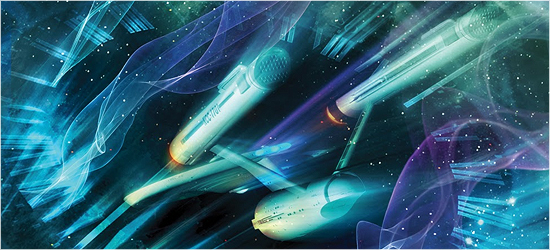
TrekCore: Department of Temporal Investigations is one of my favorite series in recent years. Are there any hints you can give us about The Collectors?
Bennett: The Collectors is different from the previous two DTI tales in that it’s not about tying together threads from previous Trek time-travel stories. It’s a straight-up DTI adventure, taking ideas and characters that I introduced in Watching the Clock and that are specific to the DTI milieu itself, and just flat-out letting my imagination run wild with them. I totally cut loose, and I had enormous fun with it.
TrekCore: Beyond Star Trek, do you have any other projects on the go that our readers should know about?
Bennett: I’ve recently sold an original novelette, “The Caress of a Butterfly’s Wing,” to BuzzyMag.com, an online SF/fantasy magazine, and I’ve just finished an original spec novel in the same universe and have submitted it to an editor, though I don’t know yet whether it will sell.
TrekCore: Thank you very much for your time, Christopher — we all look forward to more great stories from you in the future!
Christopher L. Bennett can be found online at this homepage, his blog, and on Facebook.
![]()
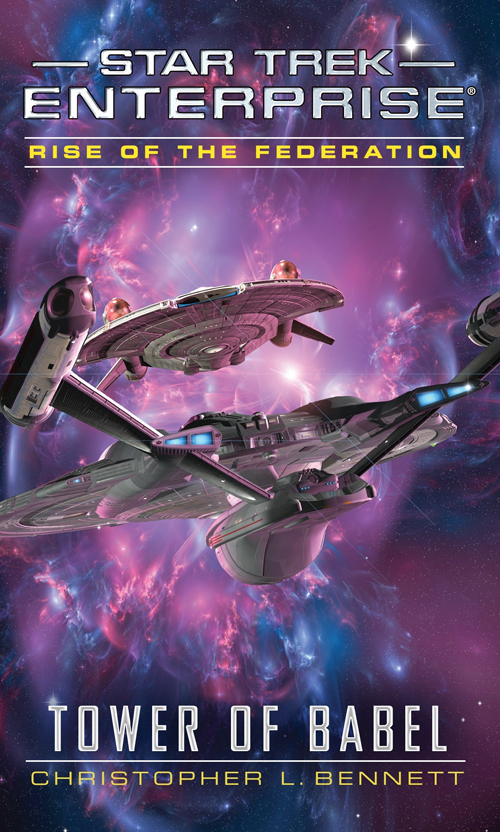 |
Order Star Trek Enterprise: Tower of Babel |
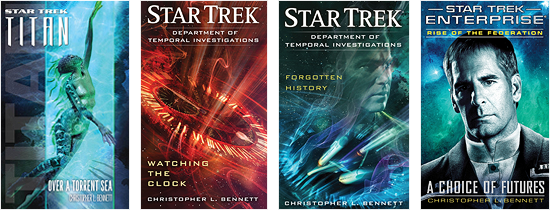 |
|||
| Amazon US Amazon UK Amazon DE |
Amazon US Amazon UK Amazon DE |
Amazon US Amazon UK Amazon DE |
Amazon US Amazon UK Amazon DE |
